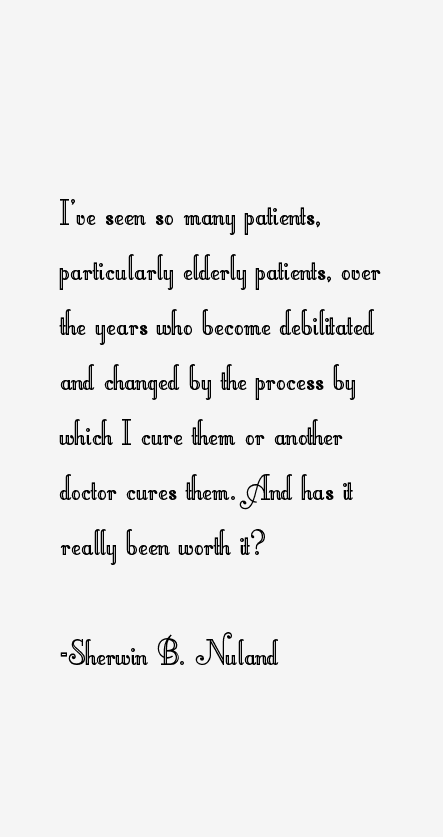Sherwin B. Nuland Quotes & Sayings (Page 3)
Sherwin B. Nuland quotes and sayings page 3 (scientist). Here's quote # 21 through 30 out of the 44 we have.
“Cancer cells are fixed at an age where they are still too young to have learned the rules of the society in which they live. As with so many immature individuals of all living kinds, everything they do is excessive and uncoordinated with the needs or constraints of their neighbors... they are reproductive but not productive.”
“'Death with dignity' is our society's expression of the universal yearning to achieve a graceful triumph over the stark and often repugnant finality of life's last sputterings. But the fact is, death is not a confrontation. It is simply an event in the sequence of nature's ongoing rhythms.”
“Do you know what the world will be saved by? I'll tell you. It'll be saved by the human spirit. And by the human spirit, I don't mean anything divine, I don't mean anything supernatural - certainly not coming from this skeptic.”
“Every hope of successive generations of scholars that order might be constructed from the chaotic mess of medical nomenclature has been frustrated. Even diseases recognized in the same historical period have been given names based on characteristics that have no relation to one another, and thus no common criteria.”
“I think when you think of death as being part of the life cycle and recognize that death is an inevitability for our species because the world has to be renewed with each death, then the hope becomes when it is renewed it will be renewed by people on whom I have had some influence for good.”

“I've seen so many patients, particularly elderly patients, over the years who become debilitated and changed by the process by which I cure them or another doctor cures them. And has it really been worth it?”

“The growing professional disciplines of medical ethics and bioethics have had a profound impact on researchers, bedside doctors, associations of physicians, and government.”
“The writings and the recommendations of the earliest medical scientists and the new breed of clinicians between the mid-fifteenth and early seventeenth centuries were based on the supposition that sufficient study and experimentation would elucidate not only the origins of disease, but its treatment as well.”
“Where nothing in a person's earlier years lends itself to an old age devoted to continuing intellectual and physical pursuits, a late-life interest in Tolstoy or even crossword puzzles is unlikely to appear, no matter the urging by well-intentioned social workers or people like me who write books about it.”
“You know, ever since man had any notion that some of his other people, his colleagues, could be different, could be strange, could be severely depressed or what we now recognize as schizophrenia, he was certain that this kind of illness had to come from evil spirits getting into the body.”
Sherwin B. Nuland Quotes Rating
No Ratings Yet
Leave A Comment
























